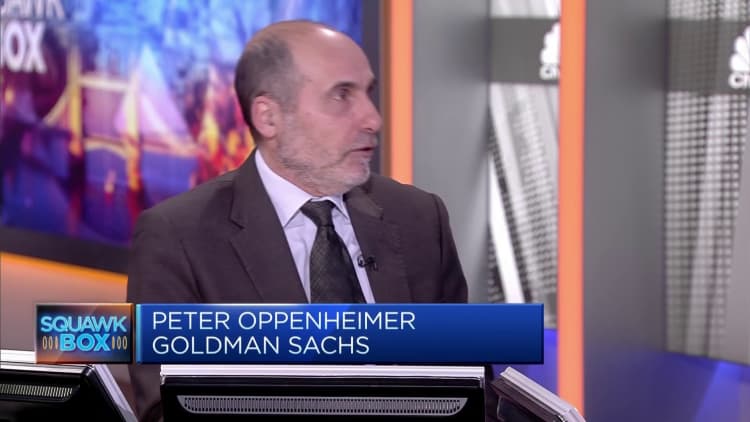[ad_1]
A display shows the Dow Jones Industrial Common after the closing bell on the ground on the New York Inventory Alternate on Dec. 13, 2023.
Brendan Mcdermid | Reuters
The worldwide economic system is transferring into a brand new “tremendous cycle,” with synthetic intelligence and decarbonization being driving components, in response to Peter Oppenheimer, head of macro analysis in Europe at Goldman Sachs.
“We’re transferring clearly into a unique tremendous cycle,” he instructed CNBC’s “Squawk Field Europe” on Monday.
Tremendous cycles are generally outlined as prolonged durations of financial enlargement, usually accompanied by rising GDP, sturdy demand for items resulting in greater costs and excessive ranges of employment.
The latest important tremendous cycle that the world economic system skilled started within the early Nineteen Eighties, Oppenheimer mentioned, discussing content material from his newly launched e-book “Any Completely happy Returns.”
This was characterised by rates of interest and inflation peaking, earlier than a decadeslong interval of falling capital prices, inflation and charges, in addition to financial insurance policies reminiscent of deregulation and privatization, he defined. In the meantime, geopolitical dangers eased and globalization grew stronger, Oppenheimer famous.
However not all of those components at the moment are set to proceed as they have been, he added.
“We’re not more likely to see rates of interest trending down as aggressively over the following decade or so, we’re seeing some pushback to globalization and, after all, we’re seeing elevated geopolitical tensions as nicely.”
The Russia-Ukraine battle, tensions between the U.S. and China largely regarding commerce, and the Israel-Hamas battle which is elevating considerations on the broader Center East are just a few geopolitical themes that markets have been fretting over in latest months and years.

Whereas present financial developments ought to theoretically result in the tempo of monetary returns slowing, there are additionally forces that might have a optimistic impression — particularly synthetic intelligence and decarbonization, Oppenheimer mentioned.
AI continues to be in its early levels, he mentioned, nevertheless as it’s used more and more as the idea for brand spanking new services, it may result in a “optimistic impact” for shares, he mentioned.
The recent subject of AI and productiveness, which has usually gone hand in hand with debates and considerations round human jobs being changed or modified, will seemingly impression the economic system.
“The second factor is [that] we’ve not but seen, and I believe we’re comparatively optimistic that we are going to see, [is] an enchancment in productiveness on the again of the purposes of AI which may very well be optimistic for development and naturally for margins,” Oppenheimer mentioned.
Regardless of AI and decarbonization each being comparatively new ideas, there are historic parallels, Oppenheimer mentioned.
One of many historic durations that stands out is the early Seventies and early Nineteen Eighties, which he mentioned have been “not so dissimilar” to present developments. Elevated inflation and rates of interest have been maybe extra structural points than in contrast with now, he mentioned, nevertheless components together with rising geopolitical tensions, rising taxes and enhanced regulation seem comparable.
In different methods, present shifts will be seen as reflective of modifications even additional again in historical past, Oppenheimer defined.
“Due to this large twin shock that we’re more likely to see, optimistic shock of technological innovation at a really speedy tempo along with restructuring of economies to maneuver in the direction of decarbonization, I believe that is a interval that is extra akin actually to what we noticed within the late nineteenth century,” he mentioned.
Modernization and industrialization fueled by infrastructure and technological developments alongside important will increase of productiveness mark this historic interval.
Crucially, these historic parallels can present classes for the longer term, Oppenheimer identified.
“Wanting again in time, cycles and structural breaks do repeat themselves however by no means in precisely the identical manner. And I believe we have to type of study from historical past what are the inferences that we will have a look at so as to place greatest for the type of atmosphere we’re transferring into.”
Do not miss these tales from CNBC PRO:
[ad_2]
Source link





